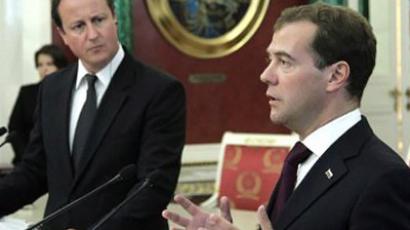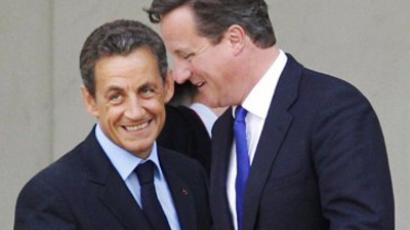Everything that Cameron didn’t say
While British Prime Minister David Cameron vowed to get the economy moving and society working, many felt that his seemingly optimistic speech was designed to side step the very real threats Britain is facing today.
While giving the keynote speech to delegates from the ruling Conservative Party at an annual rally on Wednesday, Prime Minister spoke on a variety of issues, from the country’s role in the Libyan intervention to broad-sweeping spending cuts to get the economy going. Rebuffing critics who opposed Britain’s Libyan intervention, Cameron claimed that if Britain “had stood aside this spring, people in Benghazi would have been massacred.”Evoking Gaddafi’s role in arming the IRA and the 1988 Lockerbie bombing, he told the conference they should be proud of the part they played “in giving the Libyan people the chance to take back their country.”The Prime Minister chose not to mention the fact that British intelligence had colluded with the Gaddafi regime for years to run its own rendition service, or that they had provided the deposed dictator with intelligence reports concerning persons of interest.Cameron went on to thank the troops from all over the UK who had fought to stabilize Afghanistan, saying the government was “on target to bring them home by the end of 2014.”Lauding Britain’s leadership “in fighting poverty and tyranny,” Cameron segued to the heart of the matter, namely, the permissive pessimism about their economy, society and political system that he believes has led many to think Britain’s best days are over.Thus, Cameron stated that the answer to Britain’s woes was “straightforward, but uncomfortable.” Claiming the nation was not in the grips of a normal recession, but rather a debt crisis, he argued that “borrowing to cut taxes or increase spending…won’t work because they lead to more debt, which would make the crisis worse.” Cameron’s heavy focus on debt, reforming the tax code and the pension system came as the latest Office for National Statistics figures showed the British economy grew by a meager 0.1 per cent in the second quarter.Facing fierce criticism for his planned austerity measures, the Prime Minister was softening the public up for 126 billion pounds worth of spending cuts.He also called for deregulation he claims will help business grow and ultimately create more jobs.Critics, however, accuse Cameron of giving away hundreds of millions of pounds in bailouts to corporations and banks, while a ComRes survey conducted for ITV News suggest that a majority have not been impressed with his handling of the economy. And according to the General Secretary of United Union, Len Mccluskey, Cameron is not only wrong in his solutions, he has simply missed the plot."On the day that official figures confirmed the economy has stagnated since last autumn, David Cameron told Britain that he would continue with an austerity plan which is hurting but not working.""This is a government which is out of touch with the needs and values of hard-working families who worry about how to make ends meet and what the future holds for their children," he said as cited by Reuters.And according to political speech writer Asher Dresner who spoke with RT, Cameron’s heavy focus on optimism and peripheral social issues might have been intentional, seeing that the Prime Minister has no legs to stand on when it comes to things that really matter to the British public.“He can’t talk about the National Health Service, because his plans are in disarray, he can’t talk about the economy, it’s tanking, we’ve just had bad figures out today, instead he talked about gay marriage, building homes, adoption, things which are important to some people, but which most people don’t think are essential to the political debate.”Time Bales, a professor of politics at Sussex University, was far more blunt in his criticism."David Cameron's speech was shambolic. It was more about what he didn't say than what he did. It highlights just how worryingly out of touch the Tories (Conservatives) are with ordinary working people and the everyday pressures they face," Reuters cites him as saying.Ultimately, Cameron concluded his speech with a large dose of national pride and optimism.“Let's show the world some fight. Let's pull together, work together. And together lead Britain to better days.”Whether or not a brighter future is on the horizon and the possibility of his government being a part of it remains to be seen.














